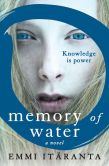Memory of Water, by Emmi Itäranta

Here’s the publisher’s summary:
In the far north of the Scandinavian Union, now occupied by the power state of New Qian, seventeen-year-old Noria Kaitio studies to become a tea master like her father. It is a position that holds great responsibility and a dangerous secret. Tea masters alone know the location of hidden water sources, including the natural spring that once provided water for her whole village. When Noria’s father dies, the secret of the spring reaches the new military commander … and the power of the army is vast indeed. But the precious water reserve is not the only forbidden knowledge Noria possesses, and resistance is a fine line.
Threatened with imprisonment, and with her life at stake, Noria must make an excruciating, dangerous choice between knowledge and freedom.
This book was at times powerful and beautiful and tragic and depressing and triumphant. There’s not a great deal of action. The pace is almost leisurely at times, even as the tension ratchets every higher. Day by day Noira goes about her business, watching helplessly as the military imprison and execute others in the village for water crimes. The waiting builds suspense and fear far more effectively than any series of graphic action or violence would have. There’s also the contrast between the horrors Noira witnesses and the beauty of Itäranta’s writing.
And then there’s the worldbuilding. The book is set in a post-apocalyptic Finland. Rising sea levels and other environmental catastrophes have eliminated most sources of fresh water and a serious, if uneven, regression in technology. We never get the full details about what happened, because Noria — like most people — doesn’t know the truth. She knows only the stories she’s been taught. But over the course of the book, she uncovers bits and pieces…
I’m sure that aspect of the book will come across as preachy to some, and there’s certainly a message here about waste and overconsumption and the environment. But given that we don’t even know the full details of what happened, it felt like a reasonable example of “If this goes on…” to me.
There’s also beauty here. The way Noria contemplates every detail of the tea ceremony, and the ideas and philosophy behind it. I don’t know enough to say whether or not the author’s description is accurate, only that it was beautifully written. There’s love as well. Noria’s relationship with her friend Sanja, who works as a plastic smith (digging up and repairing old plastic for the village) is a powerful source of conflict. While they love one another, the secrets Noria guards and the struggles they both face just to survive would strain any relationship.
You can read a sample at the HarperCollins website. I also recommend checking out this Kirkus interview with Itäranta.






Angela Highland (Angela Korra'ti)
August 11, 2014 @ 2:16 pm
I’ve got this on my To Read list–I thought the premise sounded highly intriguing, and I hope to check this one out as a way of expanding my reading horizons into stuff written by non-Anglophone authors. Looking forward to check this out!